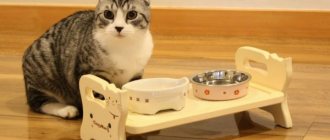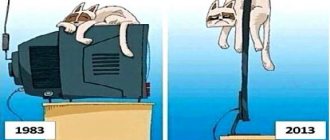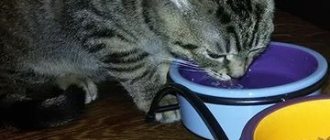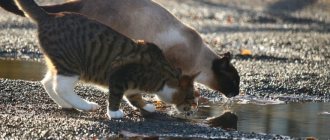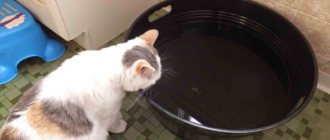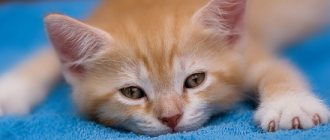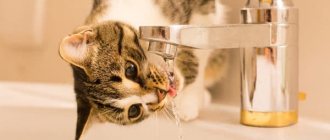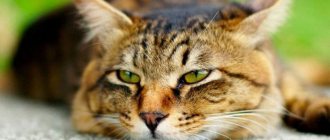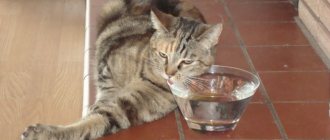What will you learn from the article?
- How long can a cat go without eating? What are the dangers of starvation?
- The main reasons why a cat refuses to eat is Stress
- Changing your diet
- Thermoregulation
- Sexual instinct
- Pregnancy
- Parasites
- Oral diseases
- Poisoning
- Foreign body or fur in the stomach and intestines
- Viral infection
- Liver, kidney and urolithiasis
- Consequences of anesthesia
- Postpartum period
A good appetite is always considered an indicator of health, so many owners begin to sound the alarm when their beloved pet eats poorly or refuses to eat at all. But refusal to eat is not always a sign of illness or behavioral disorders; sometimes it is a normal condition. You need to learn to understand why the cat does not eat in order to provide the correct help to the cat in time if necessary.
What does it mean for a pet to refuse food and drink?
There are times when a cat does not eat for several days, and at first glance it is difficult to say what is causing this. When a kitten has no appetite , it is often said that he has anorexia. Moreover, unlike hunger, which manifests itself due to the physiological characteristics of the body, anorexia is associated with psychological factors.
This condition can be provoked by many reasons, due to which the cat may lose its appetite for a long time. In a kitten, it can be observed when certain disorders occur in its body that contribute to the development of the disease. If the kitten does not show its former activity , does not eat or drink for several days and does not leave its place, then it can be assumed that it has problems with the stomach or other important organs. It's hard to imagine that a cat that experiences unpleasant pain every minute will think about food.
Another reason that may be associated with a cat's lethargic behavior is the first heat. The owner may mistake this condition for a disease . For the animal, this is the first experience when it feels natural urges, so it may behave confused. Usually the kitten behaves this way only for a few days, but then it becomes cheerful and active again.
If for two or three days you observe how the kitten does not want to eat, but only sleeps, then some kind of illness has probably come down on it. Lack of appetite is often associated with the development of infectious diseases, for example, the appearance of worms. To prevent such situations, it is advisable to periodically give him special drugs against helminths for preventive purposes.
Among the entire list of diseases, we can highlight the most common ones in domestic cats. Keep in mind that if your pet does not eat for several days , remains lethargic, and is losing weight , then you can be sure that it is some kind of illness. And first of all, you need to find out what infection caused this condition and what needs to be done.
A kitten may begin to lose weight during diseases of the gastrointestinal tract. Characteristic symptoms of this disease are diarrhea and other unconventional discharge. But to be sure that this is the disease, you should show it to a veterinarian, who can make a more accurate diagnosis.
Liver disease is also common in cats. Any change in the cat's behavior is a signal for the owner to take him to the veterinarian to be sure that nothing threatens him. To prevent this from happening again , you must be more attentive to what you feed the kitten. His diet must contain foods that can cleanse this organ.
- Diseases of the pancreas. Some animals may lack appetite precisely because of the development of this disease.
- Diseases of the reproductive system.
- Blood diseases.
- Along with the above reasons, a kitten may refuse water and food due to diseases of the mucous system - throat, nose, mouth, etc.
Other reasons
If a cat does not eat for a long time, this should not be immediately perceived as a sign of an incipient disease. It is possible that weight loss may be due to the following reasons:
- The kitten did not like the new food;
- When changing your place of residence. It often happens that cats do not immediately get used to a new place. To speed up the adaptation period, you can use special medications that help animals when moving.
- Stress arising from various reasons.
Be that as it may, if your cat has no appetite during the day, you should not panic and wonder what to do. If your pet's condition does not change over a longer period of time, then you should take him to the veterinarian . But here too there are some peculiarities. In order not to worry ahead of time about the health of the kitten, it will be useful for you to familiarize yourself with the following information:
- If you have a young and healthy cat, he can go without eating and still feel quite well for 5 days. If after this time his appetite returns, he will be able to quickly replenish the need for all the necessary vitamins and carbohydrates and will again become cheerful and active.
- If you have an older cat living in your apartment who has lost his appetite, keep in mind that he can go without food for no more than 3 days. If the matter is limited to this, and after this period his appetite awakens, then he will be able to quickly recover. But he will be able to return to his usual lifestyle only if this was not caused by a diet.
- If a similar situation happens to a small kitten who refuses to eat all day long, know that this is dangerous for his health and can result in death. The kitten does not have a sufficient supply of substances to survive without food for more than a day. Therefore, if you notice that your pet refuses breakfast, then you should immediately take action.
- Owners who keep cats with chronic diseases need to be especially attentive to their pets. Prolonged fasting is extremely contraindicated for them. And no matter what time the disease appears, you must do everything possible to ensure that the kitten does not go hungry for more than 2 days.
The reason is character
All cats are picky eaters, but in some cats, due to their nature, food whims are more pronounced. A cat “with character” may not eat for more than a day due to new, unusual or tasteless food, resentment towards the owner, or a change of environment (moving to a dacha, to a new apartment). This behavior is typical for some breeds - British, Scottish fold, Sphynx.
Sooner or later, the cat will come to terms with changes in diet or environment and will begin to eat normally. It is only important that she does not stop drinking water. If a short fast does not cause significant harm to the pet’s body, then dehydration is very dangerous.
What to do?
Having realized that something is wrong with the cat, the owner needs to decide what to do first in this case.
If the cat is lethargic
If you observe a complete lack of appetite in your cat for several days, the first thing you should do is change its diet. If you gave your pet new food in the morning and he hasn’t touched it all day, then most likely the reason is food. To switch your cat to a new food, you can do the following: take some food and mix it with the old food, reducing the amount over time.
It is possible that the whole problem is in the dirty bowl from which the cat eats. To prevent this from happening, you should wash your pet’s dishes after every meal. Another reason for a cat refusing to eat may be the incorrect location of the bowls. To determine whether this is true or not, you can put your cat's bowl in a different place and see if he touches the food. You may not have to do anything else.
If you have tried all the methods, but nothing has helped you understand why your cat has not eaten for several days, then all you have to do is show it to the veterinarian . Considering the ineffectiveness of the recommendations given, it can be assumed that this is a serious illness. Therefore, it is important to start treatment as soon as possible.
When is there nothing to worry about?
All of the listed symptoms of cat gluttony are removable and should not cause concern to owners unless severe exhaustion/obesity, vomiting after eating, or deterioration in the condition of the coat and teeth are observed. Polyphagia can be overcome by properly organizing the feeding of the purring cat.
During the period of active growth and development, which lasts about 2 years, kittens have a great need for nutritious, balanced food. They spend a lot of energy and try to replenish it by eating more than normal. If the kitten eats a lot, grows quickly and remains energetic and playful, then there is nothing to worry about.
Babies need a lot of energy
Peculiarities of eating behavior also depend on the breed, so owners should be aware of their cat’s daily calorie requirement, as well as how this parameter changes depending on the pet’s age.
Female felines may experience an increased appetite after the end of estrus, when they try hard to make up for the lack of calories by eating. During heat, a cat completely loses its appetite due to nervousness, but subsequently they simply eat up, absorbing food in unlimited quantities.
Attention! Older cats show more interest in food than young cats. An active, non-obese pet with a slightly increased appetite should not cause concern.
If he doesn't eat, doesn't drink and burps
If you notice these signs in your pet, they can be explained by the following factors:
- The cat ate the food too quickly.
- You put too much food in your lunch and your pet ate it all.
- You have given your cat food that is too dense and difficult to digest.
- You switched your pet to a new food without prior preparation.
- The food turned out to be of poor quality and had spoiled.
- It is possible that the cause of the lack of appetite is poisoning due to the cat rummaging through the trash or eating something poisonous.
Try changing the food and see if your pet still refuses to eat.
Health problems
This condition may also be associated with certain health problems. The most common are the following:
- digestive system cancer;
- renal failure of the body;
- diabetes;
- presence of infection in the stomach;
- the presence of parasites in the esophagus.
If your cat has one of the first four diseases, then you should never treat it yourself. Here you need to act differently and at the first sign, immediately show him to the veterinarian. Any other action may endanger the cat's life. increase the chances of saving and speedy recovery of the animal if a diagnosis is made in a timely manner and treatment is started. And attempts to help a cat at home can lead to the animal dying due to your experiments.
If you suspect that there are worms in your cat’s stomach, you can find out for yourself whether this is true or not without contacting a specialist. There's nothing complicated about it. To do this, you will need to purchase an anthelmintic for domestic cats at the veterinary store. It is added to water or food. But for it to work well, it is recommended to give it to the cat in its pure form.
Of course, the animal will not want to eat the medicine so easily and will break out. To do this, you will have to open your mouth with one hand and place the tablet under your tongue with the other. Make sure your cat swallows the medicine , otherwise you won't achieve anything. After your cat eats the drug, you should wait until she wants to go to the toilet.
When the cat relieves itself, you need to analyze the excrement visually. The presence of parasites in feces means that they are also contained in the animal’s body. If you were unable to detect them, then you should show the cat to a doctor.
Syringe feeding
If the pet is severely weakened due to a protracted illness, then it is possible to feed the cat in this way. You should first contact a veterinary clinic, where a specialist will tell the owner how to feed the animal correctly and which syringe to use. In most cases, a 2 mm medical device is suitable. The tip of the feeding agent is first cut off so as not to damage the cat’s mucous membranes or cause other damage. Rough edges are sanded until they become smooth. The food that needs to be fed to the cat after illness must be liquid so that it can be filled into a syringe. Using a piston, food is drawn into a tube and brought to the pet’s nose so that it can taste the food.
If the animal refuses to lick the food, it is introduced forcibly. It is recommended to wait until the cat opens his mouth slightly, after which he slowly squeezes the food onto his tongue. Do not suddenly introduce all the food at once, as the cat may vomit it soon. When a pet refuses to open its mouth on its own, the owner should slightly unclench the jaws with the help of his fingers. After the manipulation, the cat is consoled, petted and praised so that he does not have fear before the next feeding.
If the fluffy doesn't eat or drink, his nose is dry
There is an opinion among owners that a dry nose in a cat indicates the presence of a certain disease. However, this rule does not work in all cases. If you touch your cat's nose after sleep , you will find that it is dry. Therefore, the conclusion that the cat is sick will be incorrect. If your pet doesn't eat for several days and she still has this symptom, then you shouldn't wait any longer and it's time to take her to the vet.
You should not place high hopes on self-medication, since such methods may not always be effective. If the nose is dry, it won’t hurt to touch the cat , because it is possible that its temperature is elevated. If you find this symptom, then this is another reason why you should immediately show the animal to a veterinarian.
Prevention
To prevent your pet from refusing to eat, the following simple measures should be followed:
- normalize diet;
- do not allow the cat to be outside uncontrolled;
- diversify your diet;
- feed the animal only premium and super-premium mixtures;
- exclude food from the human table;
- choose food in accordance with the cat’s taste preferences;
- avoid stressing the animal;
- sterilize your pet in time or provide him with a full sex life;
- carefully transfer to a new diet, especially kittens;
- prevent the animal from overheating in the hot season;
- vaccinate annually;
- regularly deworm and treat for external parasites;
- Long-haired breeds should be combed out and given pastes to prevent the formation of hairballs;
- Bring your pet to the veterinarian regularly for checkups.
1111
